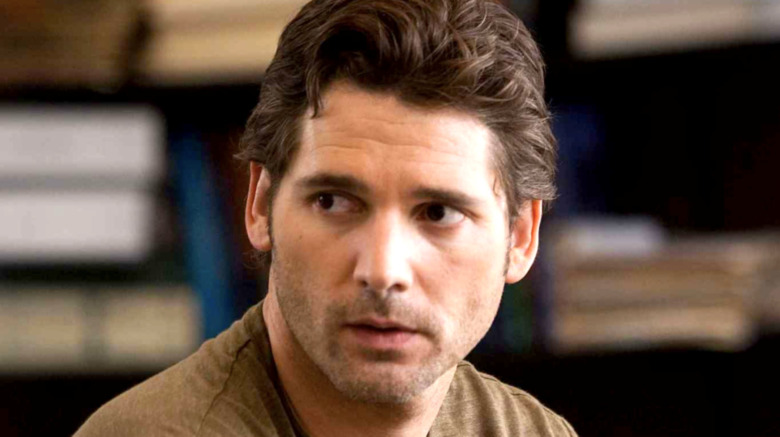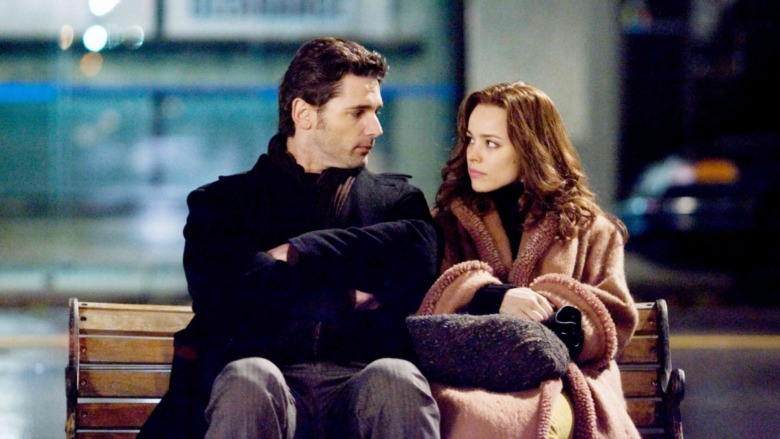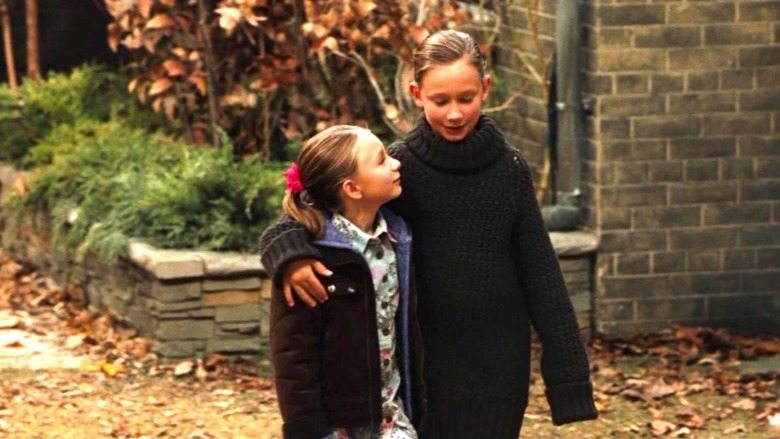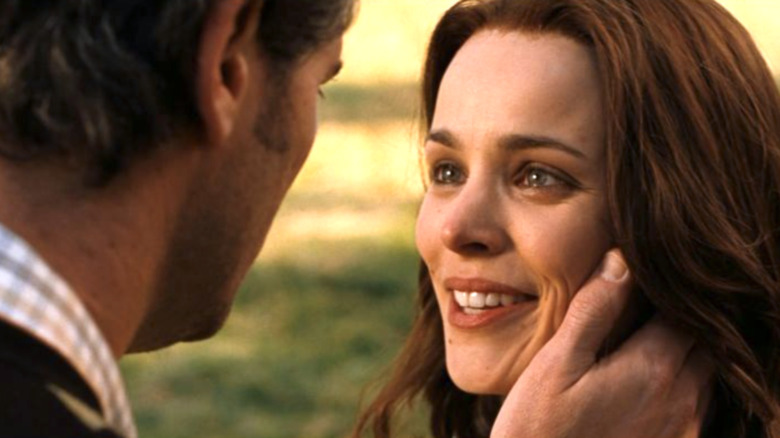The Ending Of The Time Traveler's Wife Explained
In 2009, the movie adaptation of "The Time Traveler's Wife," a bestselling novel by Audrey Niffenegger, was released. Starring Rachel McAdams as Clare Abshire and Eric Bana as Henry DeTamble, the story follows the young couple as romance blossoms between them over the years. But it's not that simple, as Henry has an incurable condition of uncontrollable time travel. Although it definitely falls in the science fiction genre due to the story revolving around Henry's time traveling condition, "The Time Traveler's Wife" is more of a romantic drama, and Clare and Henry's love story is one for the ages.
Clare first meets Henry when she is a young girl and him an adult, but as she grows up Henry continues to visit her and the two slowly fall in love. Unfortunately, dating a time traveler can be really difficult, as Henry will disappear randomly from important life moments, and appear suddenly from another time in his life. Over the course of the film, "The Time Traveler's Wife" follows the star-crossed lovers as they do whatever it takes to make their unique yet wonderful relationship work.
Fair warning, the story in "The Time Traveler's Wife" can be very confusing, so we're here to help bring a little more clarity to what exactly happens in the movie.
Here's the ending of "The Time Traveler's Wife" — explained.
How and when does Henry die?
Clare and Henry successfully fall in love, get married, and have a daughter named Alba, played by sisters Tatum and Hailey McCann. When everything in their life seems perfect, Henry randomly travels to a natural history museum and gets a huge shock. As he attempts to leave the building, a little girl yells after him, calling him "Daddy!" Henry learns that this is his 10-year-old daughter Alba and she is also a time traveler. Along with this discovery, Alba reveals that he is meeting her a few years after he dies.
Henry tries to keep the news of his impending death a secret from Clare. She eventually finds out, and the two mentally prepare for a tough road ahead. As Alba gets older and the family approaches her fifth birthday — the year when Henry dies — his travels become increasingly taxing. One incident leaves Henry frostbitten and needing a wheelchair for a few months. During another tough trip, Henry discovers that he will die on New Year's Eve from a bullet wound. When the night finally arrives, Henry doesn't tell Clare until moments before he disappears. He then travels back to Clare's childhood home in the middle of winter, where her father and brother are hunting a buck in the woods. Unfortunately, Henry appears right in front of the fleeing deer and is accidentally shot by his father-in-law. Henry then returns to his original timeline, bleeding out, and spends his final moments in Clare's arms.
The way Henry dies is strange and surprising, and to some viewers it might seem a little out-of-left-field. But considering this is a movie about a man with a genetic condition that causes him to travel through time, nothing's truly far-fetched here.
Will Clare and Alba ever see Henry again?
In the final scene of "The Time Traveler's Wife," Alba, Henry, and Clare are reunited once again. A few years after Henry's death, an earlier version of him appears at the family's home where Alba is playing in a field. She calls for her mother to come, and Clare runs into Henry's arms before he starts to fade away. Henry tells Clare that he is traveling from around seven or eight years earlier, when he is 39 and Alba is still a baby. Of course, Clare is happy to see him again, but she questions why he didn't tell her when he'd appear. Henry explains, saying, "I don't want you to spend your life waiting," and he doesn't mention if or when he may appear in her life again.
As for Alba, she likely has a lot more meetings with her father to look forward to, since she is also a time traveler. She also has some control over where, when, and how long she travels. When Henry first meets Alba in the museum, he tells her, "I haven't traveled past my own life before," which means that his travels to the future after his death only occur for five or so years before he dies. Even so, that's plenty of time for him to meet many different versions of his wife and daughter, years and decades in the future. In a later scene, as the days until Henry's death are ticking down, he also tells Alba that he's traveling a lot, yet the movie doesn't show when or where he goes.
Ultimately, it's left to the audience's imagination as to how much Henry's past travels might interact with Alba and Clare's future.
The movie has a few key differences from the book
There are a few significant differences between the movie version of "The Time Traveler's Wife" and the book, and the biggest one is the ending. In the book, Henry doesn't travel to the future to see Clare except for one time, telling Alba during one of their trips together that it's not that he doesn't want to, but that he is unable to.
In a final letter Henry writes for Clare to read after he dies, Henry tells her to "stop waiting," similar to his lines in the film's final scene. But years later, when Clare is 82-years-old, she is reunited with Henry one last time before she dies. As Syfy reported in a now-deleted interview with screenwriter Bruce Joel Rubin, he explained that "there was an ending in which you see [Clare] as an 80-year-old woman," but the test audience had a negative reaction and were confused about what was happening. Due to this response, the ending for the film version was changed.
There are many other subtle changes and a few notable differences in "The Time Traveler's Wife" as well, like Henry's state after the hypothermia incident. While the doctors are able to save his foot in the movie, Henry loses both feet in the book version, making it very difficult for him to deal with his constant traveling. Also, in the crucial moment when Henry is shot, it's Clare's father who shoots him in the film, while her brother is the one who does it in the book. It's a small change, but it was likely done because Clare's relationship with her father is more significant in the movie.



